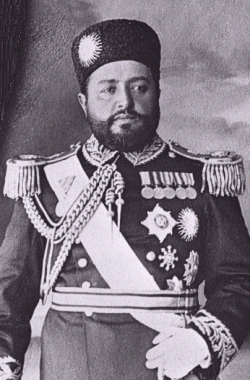Barakzai dynasty
Barakzai dynasty was a prominent dynasty in Afghanistan that played a crucial role in the country's history during the 19th and 20th centuries. The dynasty was founded by Dost Mohammad Khan after the fall of the Durrani Empire. The Barakzai dynasty is known for its significant influence on the political, social, and cultural aspects of Afghanistan, shaping the nation's destiny through a period of great change and turmoil.
Foundation and Rise[edit | edit source]
The Barakzai dynasty's origins can be traced back to the early 19th century, when Dost Mohammad Khan, a chief of the Barakzai clan, emerged as a key figure in the power vacuum created by the decline of the Durrani Empire. In 1826, Dost Mohammad Khan declared himself the Emir of Afghanistan, establishing the Barakzai dynasty's rule over the country. The dynasty was named after the Barakzai tribe, part of the larger Pashtun ethnic group, which had been influential in Afghan society for centuries.
Governance and Expansion[edit | edit source]
Under the leadership of Dost Mohammad Khan and his successors, the Barakzai dynasty embarked on a series of military campaigns to consolidate and expand their territory. They faced various challenges, including internal rebellions and external pressures from the British Empire and Russian Empire, both of which sought to extend their influence into Central Asia in what became known as the Great Game.
The Barakzai rulers implemented several administrative reforms to strengthen their control over Afghanistan. They worked to modernize the army, improve infrastructure, and encourage trade. Education and legal systems were also reformed to some extent, reflecting the dynasty's efforts to modernize the country while navigating the complexities of tribal politics and international diplomacy.
British Involvement and the Anglo-Afghan Wars[edit | edit source]
The Barakzai dynasty's reign was marked by its involvement in the Anglo-Afghan Wars, a series of conflicts with the British Empire that had a profound impact on Afghanistan's sovereignty and the dynasty's rule. The First Anglo-Afghan War (1839-1842) ended in disaster for the British, but it also destabilized the Barakzai rule, leading to Dost Mohammad Khan's temporary exile. He was eventually restored to power, thanks in part to his diplomatic skills and the changing interests of the British in the region.
Subsequent wars and diplomatic engagements with the British Empire, including the Second (1878-1880) and Third Anglo-Afghan Wars (1919), further shaped the destiny of the Barakzai dynasty and Afghanistan. These conflicts resulted in Afghanistan maintaining its sovereignty while also leading to border adjustments and the establishment of British influence in Afghan foreign policy until the country's full independence after the Third Anglo-Afghan War.
Decline and Legacy[edit | edit source]
The Barakzai dynasty's influence began to wane in the early 20th century, as internal divisions and external pressures mounted. The reign of Amanullah Khan, who attempted to implement wide-ranging social and educational reforms, ended in abdication following a civil uprising. The dynasty continued to rule in a diminished capacity until the monarchy was eventually abolished in 1973 by Mohammed Daoud Khan, a cousin of the last king, Mohammed Zahir Shah.
Despite its decline, the Barakzai dynasty's legacy in Afghanistan is significant. It presided over a period of great change, laying the foundations for the modern Afghan state. The dynasty's efforts to navigate the challenges of internal governance and external pressures, while also attempting to modernize the country, have left a lasting impact on Afghanistan's political and social landscape.
This article is a Afghanistan-related stub. You can help WikiMD by expanding it!
Search WikiMD
Ad.Tired of being Overweight? Try W8MD's physician weight loss program.
Semaglutide (Ozempic / Wegovy and Tirzepatide (Mounjaro / Zepbound) available.
Advertise on WikiMD
|
WikiMD's Wellness Encyclopedia |
| Let Food Be Thy Medicine Medicine Thy Food - Hippocrates |
Translate this page: - East Asian
中文,
日本,
한국어,
South Asian
हिन्दी,
தமிழ்,
తెలుగు,
Urdu,
ಕನ್ನಡ,
Southeast Asian
Indonesian,
Vietnamese,
Thai,
မြန်မာဘာသာ,
বাংলা
European
español,
Deutsch,
français,
Greek,
português do Brasil,
polski,
română,
русский,
Nederlands,
norsk,
svenska,
suomi,
Italian
Middle Eastern & African
عربى,
Turkish,
Persian,
Hebrew,
Afrikaans,
isiZulu,
Kiswahili,
Other
Bulgarian,
Hungarian,
Czech,
Swedish,
മലയാളം,
मराठी,
ਪੰਜਾਬੀ,
ગુજરાતી,
Portuguese,
Ukrainian
Medical Disclaimer: WikiMD is not a substitute for professional medical advice. The information on WikiMD is provided as an information resource only, may be incorrect, outdated or misleading, and is not to be used or relied on for any diagnostic or treatment purposes. Please consult your health care provider before making any healthcare decisions or for guidance about a specific medical condition. WikiMD expressly disclaims responsibility, and shall have no liability, for any damages, loss, injury, or liability whatsoever suffered as a result of your reliance on the information contained in this site. By visiting this site you agree to the foregoing terms and conditions, which may from time to time be changed or supplemented by WikiMD. If you do not agree to the foregoing terms and conditions, you should not enter or use this site. See full disclaimer.
Credits:Most images are courtesy of Wikimedia commons, and templates, categories Wikipedia, licensed under CC BY SA or similar.
Contributors: Prab R. Tumpati, MD




